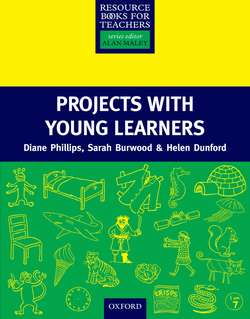Читать книгу Projects with Young Learners - Diane Phillips - Страница 5
На сайте Литреса книга снята с продажи.
Introduction
ОглавлениеWho is this book for?
Young learners
The projects described in this book are designed for children of primary and early secondary school age, from five to fourteen. All the ideas and activities have been devised, or developed and tried out, by practising teachers; they have been used and evaluated with a wide range of nationalities, in both monolingual and multilingual groups of various sizes.
Children of the same age vary in terms of their maturity, intelligence, cultural, and home background. So, although an age range is recommended for each activity, you, the classroom teacher, are the best person to judge whether the topic and activities of the project are of interest to, and within the capabilities of, your pupils.
Through project work in their English class, the children will be encouraged to develop their intellectual, motor (physical), and social skills. However, they should not be expected to do tasks in a second or foreign language that they could not attempt in their first language. Teachers of English should be aware, for example, of the literacy skills that the children have in their first language and, especially for the very young children, how much opportunity they have had to practise such motor skills as cutting, folding, colouring, and so on.
Teachers
You will find the activities in this book useful if you are a teacher:
– in a primary school, where English language tuition is included in the curriculum
– in a private language school, and you wish to integrate motivating and challenging activities and materials into a standard coursebook-based curriculum
– of children on an intensive course, in English-speaking countries in the summer
– in a UK school or an English medium school, and you wish to help pupils bridge the gap from the specialized English as a Foreign Language classes to the mainstream classes.
Why project work?
The project is an ideal vehicle for teaching primary school children for a number of reasons.
It is an integrated unit of work
A project is a recognizable unit of work with a beginning, middle, and end. Through a series of worthwhile activities, which are linked to form a tangible end-product, the children can gain a real sense of achievement. At the successful completion of the project, both teacher and pupils have something they can be proud of, to show to parents and to others in the school as an indication of the progress they have made.
It educates the whole child
A project involves the development of the whole child, rather than focusing narrowly on teaching language. Within the framework of a project can be included the full range of skills that children are developing in their other classes and during their time out of school:
– the intellectual skills of describing, drawing conclusions, using the imagination, hypothesizing, reading, and planning
